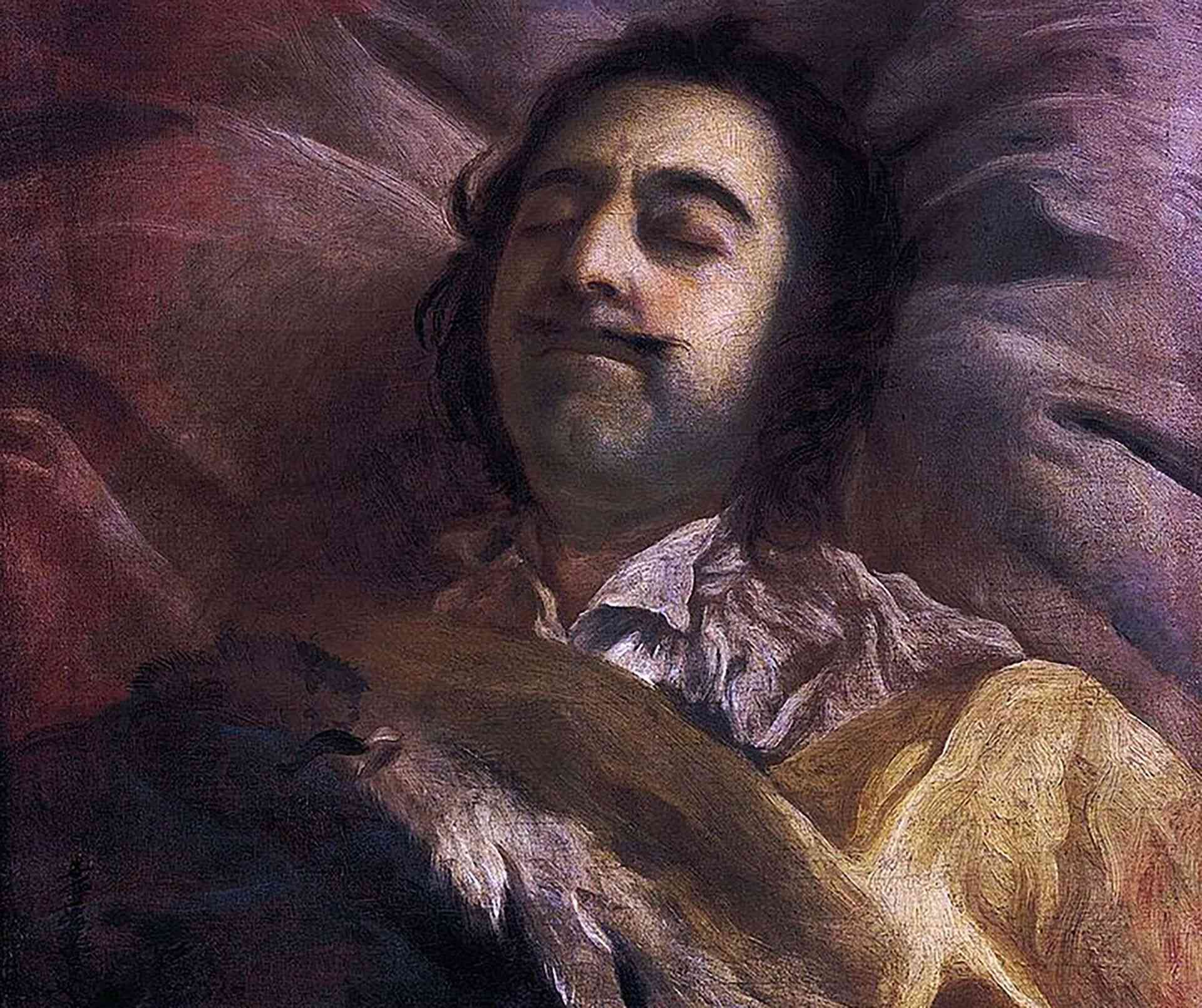Peter The Great
Peter the Great, expanding Russia and using trips to Europe to his advantage paved the way for Russian economic profit.
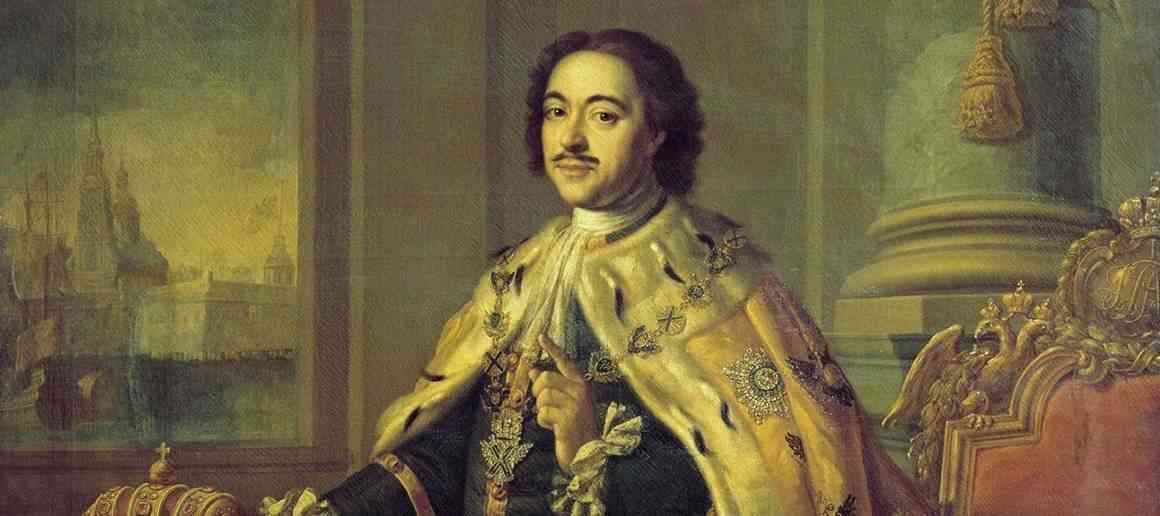
In 1685, in Russia...
Peter crouched beside his cannon playing soldiers, like any spoiled child, peter believed that whatever he wanted, he should have and the sooner the better. As a little boy, he had trained monkeys and dancing bears to entertain him and a staff of dwarfs to serve him.
When he grew older and wanted to play soldiers and wars. and he was given an army of children under his command, most boy who became kings when they have an army they used to play as Commanders or leaders to this army of children. but Peter never did, he assigned him self the lowest rank and and worked his way up. Perter Believed that Honor should be earned through hard work and learning, not earned or given easily just because you are king or rich man.
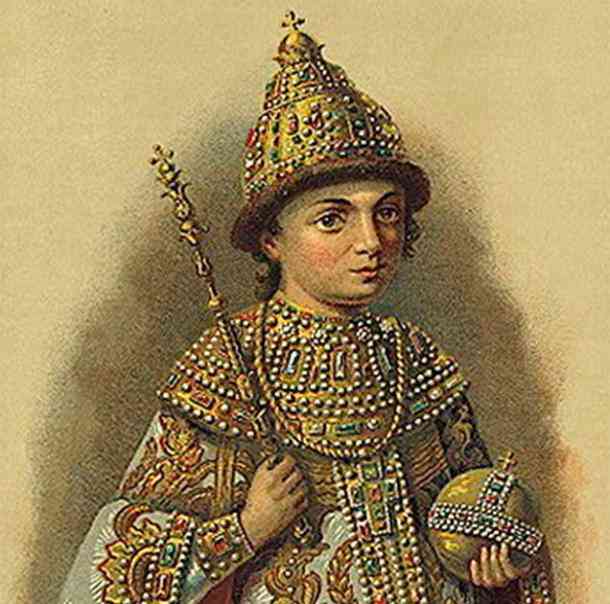
Russia was vast, the largest nation on earth. It spread From the wast to the pacific ocean on the east. In Europe amazing thing were happening: Explorers, Scientists, musicians and painters but the Russians don't like modern changes they used to live in the old ways and believe the life should be the same as it had been in their fathers and grandfathers time.
They did not wish to visit Europe the see exciting new discoveries and didn't like the Europeans who came to Russia for a visit.Simply they wished to be left alone.There are a few European who lived in Russia as a government advisors like to run the Russian Army or economy.
They are not allowed to live among the Russians and were kept together and settlement made of Grand mansions with avenues and little parks with splashing fountains and they walking wearing a stylish clothes and making a luxurious dinner parties.
Peter knew all of them for they were his teachers in military arts; they used to tell him about the outside world he thought like their world was wonderful and amazing and he wished to see their world and make Russia like their countries.
In summer's days Peter found an old English boat Peter Shouted and cried "Can we sail it ?" "Can we make it do this?" after the boat been fixed up. at last the boat was launched to the river enjoy sailing the boat in the river and he took a moment of peace and think about the future of Russia Imagining the naval port in his vast country and he decide at this moment: The Russia must have Navy and Port to put the ships in it. In this moment Peter decide to bring Russia to modern world.
Peter spent most of his time with the Europeans in Russia Imitating their ways of living and clothes. He enjoyed to learn from them and he decide to do what no Russian Tsar had ever done: he would travel to the west to see Europe with his own eyes. He planned to travel as a common soldier to keep himself out of sights to don't waste time and effort.
In 1697 he left Russia with company of 250 men Include: Ambassador, Priests, noblemen, cooks, soldiers and musicians. They visited within a year and a half : Latvia, Poland, Germany and Austria especially wanted to visit Holland and England to learn how to build ships.
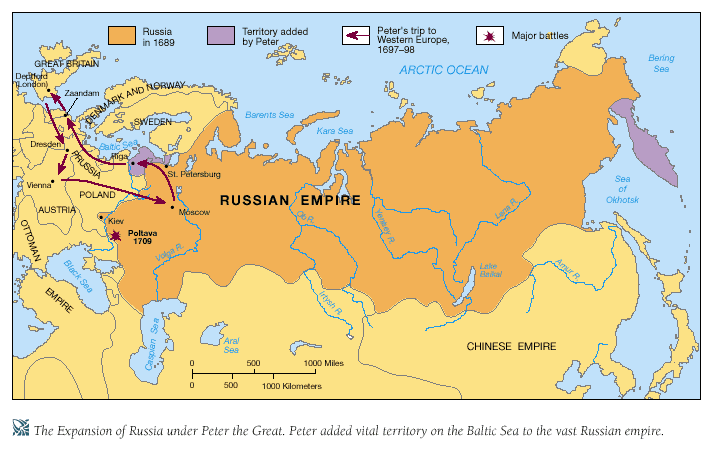
When peter reached Holland how cannot wait until he go to the shipyard and begin to work by his hands with his own tools as a carpenter to learn Shipbuilding.
The people crowded to see the Carpenter-Tsar. The guards pushed the crowds away. At last Peter was forced to flee to Amsterdam, there he can work peacefully, in the shipyard of East India Company. Peter didn't want to stay in luxurious house he chose to stay in the house of a master in ropemaking, he made his food and ignited his fire fixing his shoes.
After four months the ship was finished and Peter was given a papers that said he was a "master of the art of naval architecture"
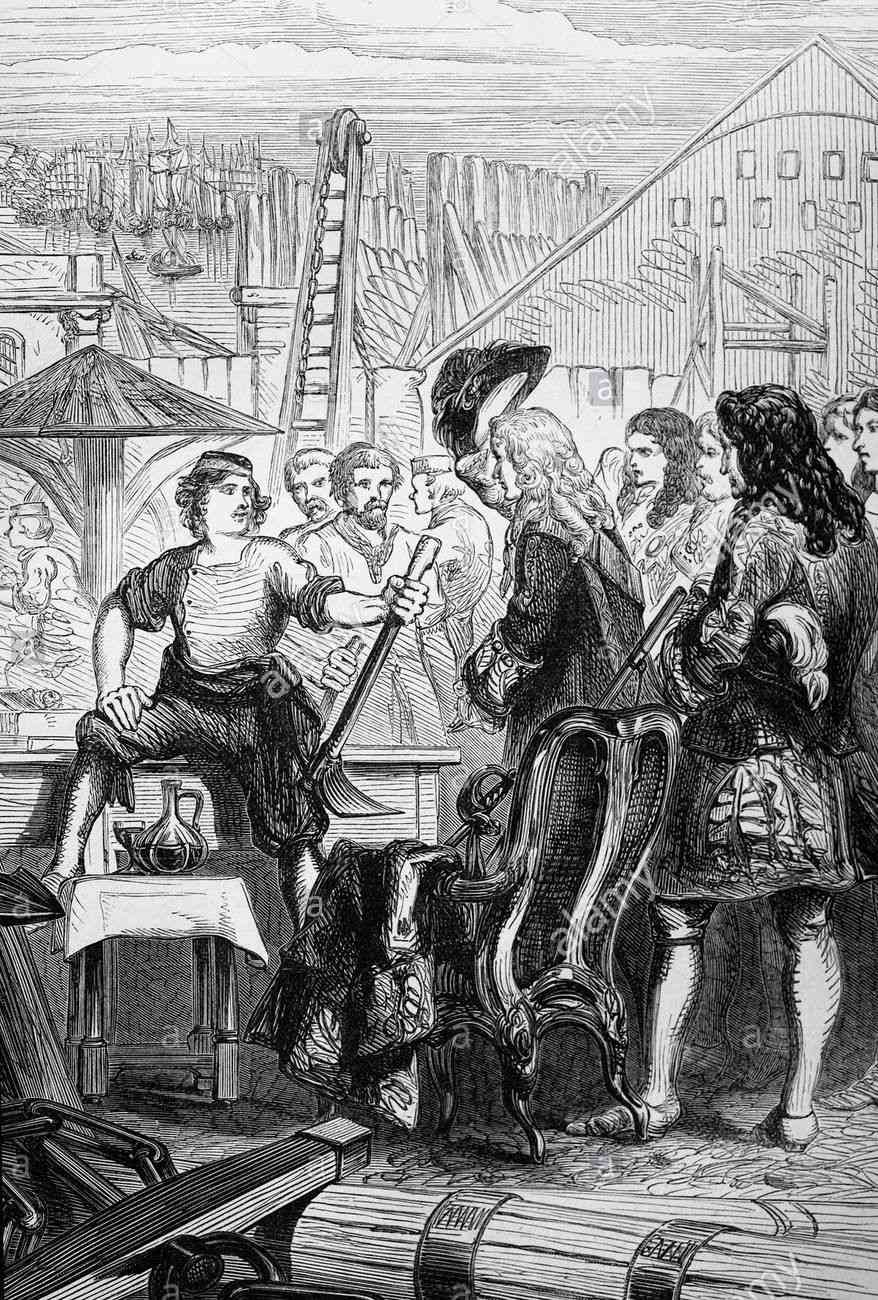
From Holland he went to England, to the Watchmaker to have his watch repaired. He observed the Watchmaker and learned how to take the watch apart and put it back together again. He studied the anatomy of the human body as well.
He mastered every thing the first time he studied or watched a mentor create it.
He purchased every thing he saw any thing can be transportable he took it,
Microscope, Coffins, Barometers and hired eight hundred people: Barbers, Naval engineers, doctors and technicians of all kinds. Peter took ten ships with him to Russia.
As Peter went back to Russia with his ships, King William III of England was prepared him a surprise he Divided his Navy into two opposite Forces and battle each other of course the cannons did not fire a cannonballs just some smoke and enough noises.
After That Peter made a temporary peace with the Ottoman Empire, He sought to acquire control of the Baltic Sea which had been taken by the Swedish Empire, Russia declared war on Swedish empire at 1700 and failed and he Failed at Battle of Narva in 1700 and he named the city that he taken from the Swedish Empire "Saint Petersburg" in 1703 and make it the Capital of the Tsardom of Russia and lasted the Capital of Russian Empire until 1917 and he had a lot of wars in his life.
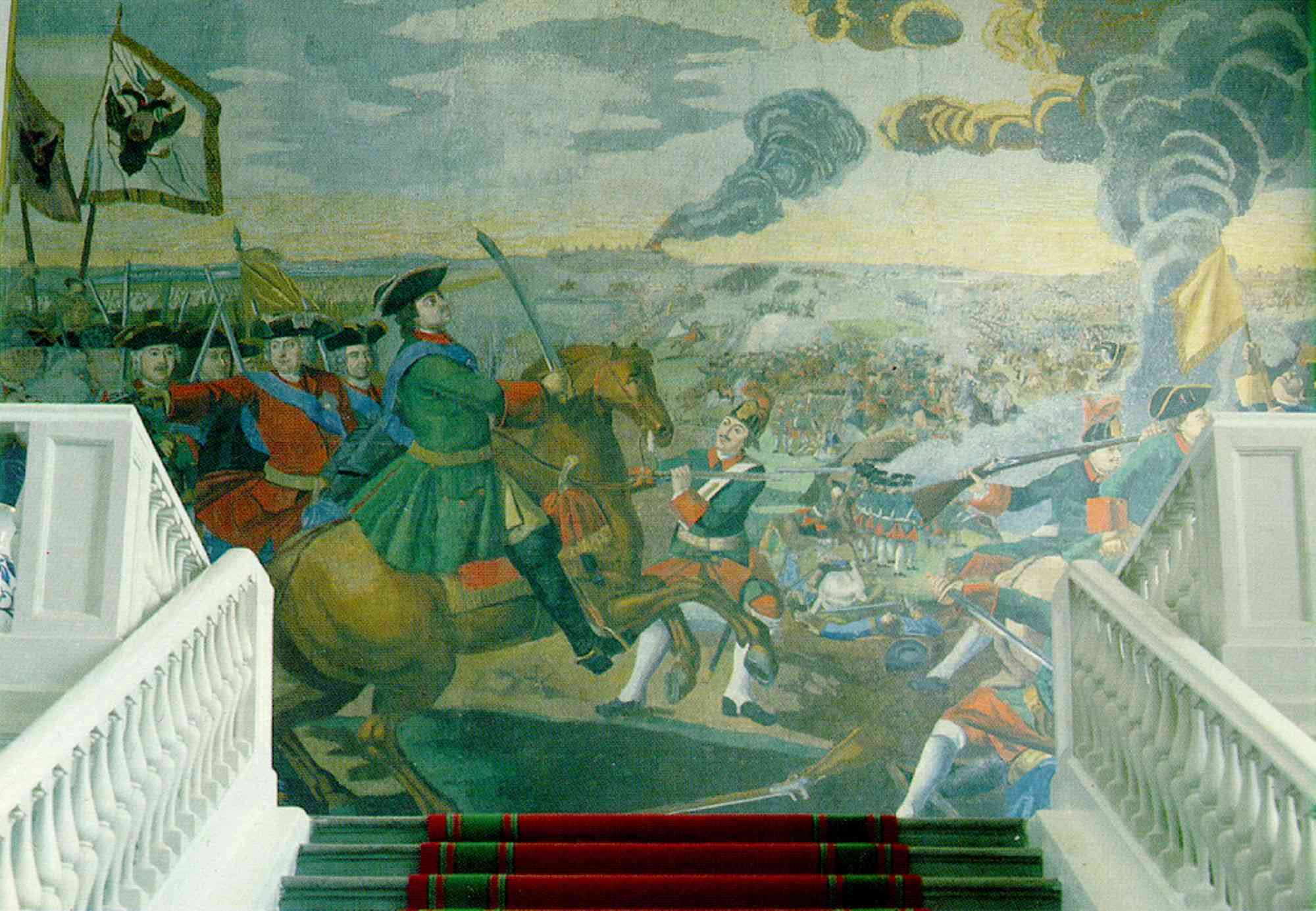
After he came back from his journey from the west, he took his razor and started to shave the noble man long beard and he Issued an order that all men must shave their beards except Priests and peasants. If a man insisted on keeping his beard he must pay a yearly tax.
After the beards were gone he started to cut his noblemen's clothes and make them shorter. He had them to kneel down and then he cut their robes at the point that touched the ground.
Peter Spend the Remain of his life in hard working he woke up every morning at four and start to work with his bedclothes. he works for fourteen hours a day.
He Issued an order that anyone able to serve Russia Should take a place in the Government whether or not of noble birth, he stared a massive campaign of Education and he educated the uneducated people.
Later in Russia a lot of Books and newspapers pop up around the nation. Peter established a new Academy and Museum. and if you came to the museum you get a coffee and wine for free to encourage people to come. he build a lot of things around the nation like canals and a lot of factories to produce all kinds of goods.
It was impossible for any country to make so many changes at the same time, and so quickly. But Peter always got what he wanted, and what he wanted most was a modern Russia. He worked hard and made sacrifices; he believed that his countrymen should be willing to do the same.
They were bled dry by taxes , for Peter was not only rebuilding Russia: He was also at war with Sweden. As usual, it was the poor working men and women who owned no land and had few rights. They had to send their sons to fight in the army for a term of twenty-five years. They had to pay taxes on candles and nuts, boots and hats, horses, beehives, beards, chimneys, and drinking water. Peter had a regular committee whose job it was to think up more taxes.
And what of Peter's greatest dream, the reason he had learned to build ships Russia must have a navy of her own! Now, at last, he had a place to put it: In the war with Sweden he had captured a marshy strip of land on the Gulf of Finland. And although it was far to the north, freezing cold, and little more than a swampy wilderness, Peter planned to build there, not just a port and fortress to Protect it, but a whole city. It was to be called Saint Petersburg, and become the Russian Capital.
Most cities begin as small settlements and grow gradually over hundreds of years. Peter wanted his city overnight. An army of workers was ordered to this frigid , desolate place.
There was no wood or stone to build with and no food to feed the workers ; everything had to be brought up from Moscow. Because picks and shovels were scarce , in the early years workers were forced to dig the foundations with their bare hands. Through floods in summer and unbearable cold in winter the work went on . Thousands of men lost their lives . The Russians called it a "city built on bones."

Naturally, no one wanted to live on that damp, icy, isolated marsh, so Peter ordered them to come. The royal family, noblemen, and many rich merchants had to leave their comfortable lives in Moscow and build, at their own expense, grand houses in the new city. Simply because Peter wanted it, there grew up out of nothing one of the loveliest cities in the world, a remarkable blend of east and west. With its graceful and majestic buildings in soft yellows and blues and its many bridges joining the nineteen islands to the shore, it is known as the “Venice of the North.”
On January 16, 1725, while he was busy with the building of his city, Peter fell ill with an infection and took to his bed. He continued to work at the business of government in his dressing gown, propped up with pillows and anxiously watched by his doctors. Many times Peter had been sick and recovered to work even harder. But now he grew worse and had to send his ministers away. A priest was called to give him the last rites of the church.
“I hope God will forgive me my many sins,” Peter whispered, “because of the good I have tried to do for my people.”
In the morning chill of January 28, after days of hovering between life and death, Peter died. He was fifty-three years old, carried in the coffin to the Fortress Cathedral. As they trudged noiselessly through the snow some must have thought, “Now I can go home to Moscow. And perhaps the taxes will stop.” Others surely asked, “How can we go on without him? How could such a man die?"
In the cathedral they prayed for his soul. “O men of Russia!” said the priest. “What is this that we do? The man we lay to rest this day is surely Peter the Great! He has gone, but his work will survive him. He made Russia powerful, and so she will remain.”
Though his life was ended and other Tsar would sit on his throne, what Peter began went on and on, and Russia was changed forever.
